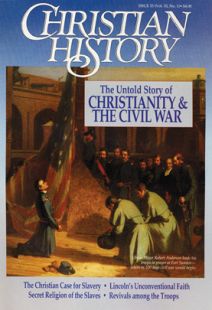Christian History Timeline: Christianity and the Civil War
Christian / Church Events
1830–1831: Charles Finney spurs great revival in Rochester, NY; crime drops and taverns go out of business
1833: American anti-Slavery Society forms, committed to non-violent moral opposition to slavery
1835: Finney’s Lectures on Revivals published; Alexander Campbell defines restorationist theology
1867: General Howard helps found Howard Theological Seminary for African-Americans
1865: Estimates of 150,000 conversions in the Confederate Army, and perhaps as many in the Union Army; Hudson Taylor begins China Inland Mission
1837: Presbyterian Church splits into Old and New School branches; Theodore Weld writes The Bible against Slavery
1840: Missionary David Livingstone sails for Africa
1843: William Miller’s predicted date for Christ’s return passes; Adventist churches begin to form; abolitionists within Methodism separate and form Wesleyan Methodist Church
1844: Joseph Smith, founder of Mormonism, assassinated; YMCA founded
1845: Southern Baptist Convention forms as Baptists separate over slavery
1847: John Humphrey Noyes moves his perfectionist colony to Oneida, NY; Mormon migration to Utah
1854: Immaculate Conception of Mary dogma; Charles Spurgeon comes to New Park Street Church
1855: Dwight L. Moody converted
1857: North-South division of Presbyterians completed; Jeremiah Lanphier begins weekly prayer meetings in New York City
1858: China opened to Christian missions; “Third Great Awakening” of daily prayer meetings across the U.S.; estimated 1,000,000 converted
1861: U.S. Christian Commission founded; Scripture and tract distribution to soldiers begins (over 11,000,000 the first year)
1862: Revivals begin in regiments from Georgia; Julia Ward Howe writes “The Battle Hymn of the Republic”
1863: The “Great Revival” throughout the Confederate Army; revivals begin in the Union Army; U.S. Christian Commission reports over 18,000,000 tracts and Scripture portions distributed to soldiers
1864: Revival in General Lee’s Army of Northern Virginia interrupted by Grant’s attack; “In God We Trust” first put on U.S. coin; Pope Pius IX’s Syllabus of Errors condemns socialism, liberalism, and rationalism
Political / World Events
1830: Daniel Webster debates states’ rights in Senate
1831: William Lloyd Garrison launches abolitionist periodical The Liberator; Nat Turner’s slave revolt
1832: New England anti-Slavery Society formed; Andrew Jackson reelected
1833: Founding of Oberlin College, abolitionist stronghold and first co-ed college; slavery abolished in British Empire
1833–37: Financial panic in the U.S.
1834: anti-abolition riots in the North
1836: Martin Van Buren president
1837: Elijah P. Lovejoy, editor of abolitionist paper, murdered; telegraph invented; Victoria queen of England
1838: Underground Railroad established
1840: Benjamin Harrison elected president; first postage stamps (3 cents)
1841: John Tyler becomes president
1844: James K. Polk elected president
1846—48: Mexican-American War
1847: Frederick Douglass launches North Star newspaper
1848: Zachary Taylor elected president; Marx’s Communist Manifesto
1850: The Compromise of 1850 enacted; Millard Fillmore president; U.S. population—23 million (3.2 million slaves)
1852: Franklin Pierce elected president; Harriet Beecher Stowe’s Uncle Tom’s Cabin
1854: Birth of the Republican Party
1856: James Buchanan elected president
1857: Dred Scott decision: Supreme Court rules that a “Negro” descended from slaves is not a citizen
1858: The Lincoln-Douglas Debates
1859: Charles Darwin’s Origin of Species; John Brown’s raid
1860: Abraham Lincoln elected president; South Carolina secedes from Union (Dec. 20)
1861: Jefferson Davis elected President of Confederacy (Feb. 9); Fort Sumter fired upon (Apr. 12); Tennessee 11th and final state to secede (June 8); in first battle of Bull Run (Manassas), Confederates rout Union forces
1862: Union wins control of Mississippi River; Battle of Antietam yields single bloodiest day in American history—22,719 killed, wounded, or missing (Sept. 17)
1863: Lincoln issues Emancipation Proclamation; 50,000 casualties at Gettysburg; Gettysburg Address (Nov. 19); Lincoln proposes national day of Thanksgiving
1864: Lincoln reelected; Sherman’s march through Georgia
1865: Lee surrenders at Appomattox (Apr. 9); Lincoln dies (Apr. 15); Andrew Johnson becomes president; 13th Amendment abolishes slavery; Ku Klux Klan organized
1866: First formal observance of Lincoln’s birthday; Congress passes Civil Rights Bill
1867: Congress passes 3 Reconstruction Acts; vote given to all males over 21; Russia sells Alaska to U.S.
1868: President Johnson impeached; Ulysses S. Grant elected president; 14th Amendment grants citizenship to African-Americans.
By Keith J. Hardman
[Christian History originally published this article in Christian History Issue #33 in 1992]
Dr. Keith J. Hardman is chair of the department of philosophy and religion at Ursinus College, Collegeville, Pennsylvania, and the author of Charles Grandison Finney, 1792–1875: Revivalist and Reformer (Syracuse, 1987).Next articles
Christianity and the Civil War: A Gallery of Fighters of Faith
These Christian generals helped wage the Civil War, and their faith affected how they did it.
Jeffery Warren ScottWhat About Ulysses S. Grant?
He was the Union’s leading general and twice president of the United States. But he was no saint.
the EditorsPreaching the Holy War
What did Protestant ministers say about the raging national battle?
James H. MoorheadGod Is On Our Side
Selections from sermons during the Civil War era. From God Ordained This War: Sermons on the Sectional Crisis, 1830–1865 edited by David B. Chesebrough (University of South Carolina press, 1991). Used by permission.
the Editors



